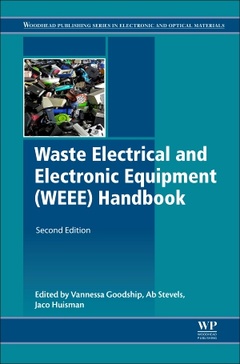Description
Waste Electrical and Electronic Equipment (WEEE) Handbook (2nd Ed.)
Woodhead Publishing Series in Electronic and Optical Materials Series
Coordinators: Goodship Vannessa, Stevels Ab, Huisman Jaco
Language: English
Subject for Waste Electrical and Electronic Equipment (WEEE) Handbook:
Keywords
50625Audit; Awareness and education; Basel convention; Best practice; Biomimicry; Business and finance; Business models; CENELEC; China; Circular economy; Collection; Conformity verification; Consumer awareness; Critical raw materials; Denmark; Design feedback; Design for reuse and recycling; Design for sustainability (DfS)Ecodesign; Design; Directive; Dismantling; Displays; Ecodesign regulation; Eco-efficiency of take-back and recycling; Ecolabels; Economic impacts; Education; Electronics; Energy-related products (ErP)Energy-using products (EuP)Framework directive; Enforcement; Environmental compliance; Environmental impacts; Environmental pollution; EP standard “ Specifications for Environmentally Compatible Product and System Design (formerly SN 36350-1/2/3/5/7)” Siemens standard SN 36350Substance and material management; EuP; E-waste or electronic waste; E-waste policies; E-waste; e-waste; Generation; Green design; Green public purchasing
728 p. · 19x23.3 cm · Paperback
Description
/li>Contents
/li>Readership
/li>Biography
/li>Comment
/li>
Waste Electrical and Electronic Equipment (WEEE) Handbook, Second Edition, is a one-stop reference on current electronic waste legislation initiatives, their impact, and the latest technological considerations for reducing electronic waste (e-waste) and increasing the efficiency of materials recovery. It also provides a wide-range of global and corporate examples and perspectives on the challenges that face specific regions and companies, along with the solutions they are implementing in managing e-waste, offering further insights on how discarded products can be treated. Sections introduce the reader to legislation and initiatives to manage WEEE and discuss technologies for the refurbishment, treatment and recycling of waste electronics.
Further sections focus on electronic products that present particular challenges for recyclers, explore sustainable design of electronics and supply chains, discuss national and regional WEEE management schemes, and more.
2. The e-waste development cycle e part I, introduction and country status
3. The e-waste development cycle, part IIdimpact assessment of collection and treatment
4. The e-waste development cycle, part IIIdpolicy & legislation,business & finance, and technologies & skills
5. Implementation road map and conditions for success
6. The WEEE forum and the WEEE label of excellence project
7. Reduction of hazardous materials in electrical and electronic equipment
8. The materials of waste electrical and electronic equipment
9. Refurbishment and reuse of waste electrical and electronic equipment
10. Mechanical methods of recycling plastics from WEEE
11. Recycling printed circuit boards
12. Recycling liquid crystal displays
13. Recycling cooling and freezing appliances
14. Recycling batteries
15. Rare earth metal recovery from typical e-waste
16. ErP e the European directive on ecodesign
17. Sustainable electronic product design
18. Waste electrical and electronic equipment management in Europe:learning from best practices in Switzerland, Norway, Sweden and Denmark
19. WEEE management in China
20. E-waste management in India
21. WEEE management in Japan
22. HP’s WEEE management strategy
23. Siemens’ WEEE management strategy
24. The history of the take-back and treatment of consumer waste electrical and electronic equipment at Philips
25. Creating a corporate environmental strategy including waste electrical and electronic equipment take-back and treatment
Designers, producers and distributors of electronic products; Companies involved in waste management and recycling of WEEE metals, glass and plastics; Material scientists and engineers; Environmental engineers; Waste consultants; Government agencies; Policy makers
Ab Stevels has done trailblazing work in making Applied EcoDesign into day-to-day business really happen and has researched in detail the setting up of take-back and recycling systems for electronics For these purposes tools and management procedures have been developed which have proven their strength through their practical success.
Ab is the author of some 200 journal articles and conference contributions. Training courses on applied EcoDesign have been held at various universities (Delft, Stanford, TU Berlin,TU Vienna, TU Ostrava, the University of Arts and Design in Farnham (UK) , Mexico City, Hong Kong Poly, NTNU( Trondheim, Norway), Tsinghua University (Beijing) , and at various Philips departments and divisions around the globe and at other companies.
In 2013 he developed a 'MBA and Sustainability' course in cooperation with the University of Sao Paulo.
For his work in Applied EcoDesign he got an honorary degree from the University of Arts and Design. For his contributions in the field of recycling of electronics he got the "Cowbell Award"from the International Electronics Recycling Conference Organization. In 2014 the World Green Design Organization awarded him a "Green Design Contribution Award'.
Dr. Huisman holds a Master’s degree in Chemical Engineering from Eindhoven University of Technology and a Ph.D.
- Addresses the latest challenges and opportunities for electronic waste (e-waste) management, including e-waste collection models, circular economy implications, rare earth metal recovery, and much more
- Draws lessons for waste electrical and electronic equipment (WEEE) policy and practice from around the world
- Discusses legislation and initiatives to manage WEEE, including global e-waste initiatives, EU legislation relating to electronic waste, and eco-efficiency evaluation of WEEE take-back systems

